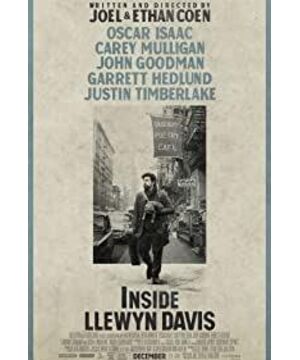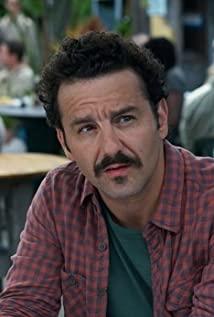"If a song is neither new nor out of date, then it's a ballad"
Drunk Country Ballad, I was hooked when I first heard the name.
I think the translator of the title must be a deep folk obsessed, or maybe "drunk town" is used to describe the slightly run-down town.
To be precise, I fell in love with this movie because of one song, which is five hundred miles.
In addition, the other soundtracks of the movie are also very good, including the cheerful "Please, Mr. Kennedy", which friends who are interested can enjoy slowly in the movie.
Back to the movie, the story takes place in the United States in the 1960s. Our protagonist, Levine, is a little-known folk singer. He is homeless and has no fixed job. He has to rely on friends every night. Relief finds a place to live.
However, despite being in a predicament, the stubborn Le Verne is unwilling to give up his dream to conform to the public's preferences. Even though life has raped him, and his purpose is to never let life be fun again, he is fighting hard for this, but life makes all kinds of jokes with him.
The 1960s was a time when folk singers flourished. The songs at that time were not only musical achievements but also historical witnesses. The story of time was told in the lyrics. It can be said that many singers were poets.
But it is also against this background that too many people want to be eager to try in the music world, and maybe nine out of ten are like Le Verne, talented, but not top; ambitious, but not determined. So life is like the cold wind of winter, slapping them hard.
The artist is always alone, and neither his best friend nor his closest sister can understand his pursuit of his dreams.
Le Vern said: "You know, there are two kinds of people in the world, the first kind of people like to classify people..." His former friend Jane interrupted him mercilessly: "The second kind It's a loser like you!"
The directors of the Coen brothers broke the conventions of the film market. The male protagonist in the picture, Levine, did not have any growth. Just like the same scene at the beginning and end of the film, Levine eventually returned to the "drunk town" where he set out.
The Coen brothers spent nearly two hours presenting the chaotic era to the audience. The down-and-out LeVine may still be down, but what he didn't know was that Bob Dylan was deeply influenced by him and was rising. .
(Little Easter egg, before LeVine stepped out of the stage at the end of the film, Bob Dylan was the one who sang on stage, and LeVine has someone else in history)
The two brothers once said in the New York film industry that they are very fortunate to have support for whatever film they want to make now.
Indeed, this is something that no number of struggling independent filmmakers dare to imagine, because there are countless young people with dreams at the bottom, who are overdrawing their lives for the sake of art, and may end up with nothing. There are many talented young and energetic creators among them, but they are tightly suppressed by the current film industry's rule that celebrities come first and money first, and they may eventually give up their favorite careers.
I hope that each of us can keep our innocent heart and persevere for our dreams.
Just two days ago, a colleague told me about a news he saw. He said that a destitute young man was standing at the gate of Beiying all day long, eager for Bole to recognize his acting talent, but he might even have lunch money in his pocket. are not enough.
I may not be obsessed with the dream to that extent, but I admire the persistence in his heart. But the colleague said in a slightly disdainful tone: Isn't it stupid to pursue your dreams even if you haven't solved your own food and clothing.
This is indeed a very real question, and I have no power to refute it. But I think that rather than mocking the way others pursue their dreams, this spiritual pursuit of "better for jade than for tiles" may be more worthy of our deep consideration.
View more about Inside Llewyn Davis reviews











